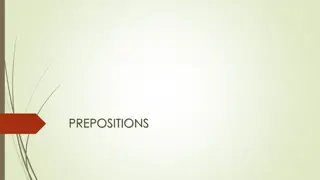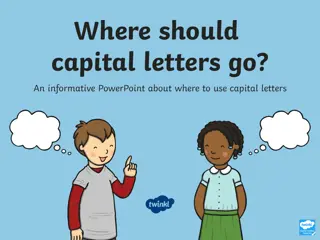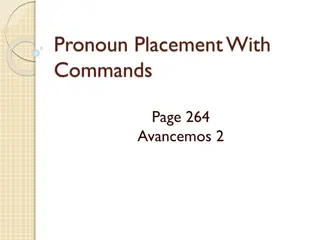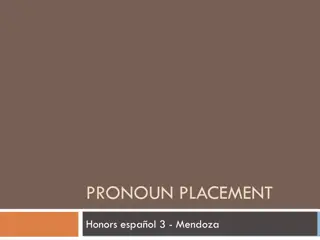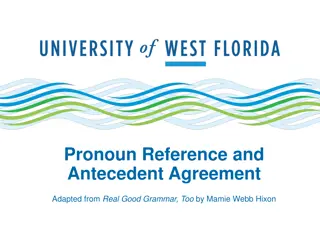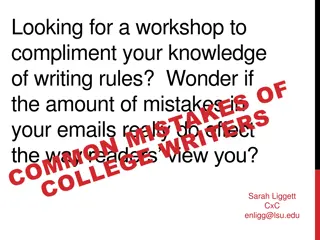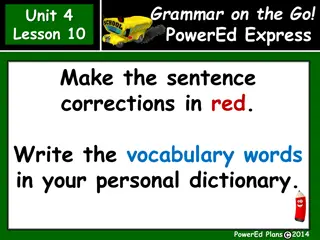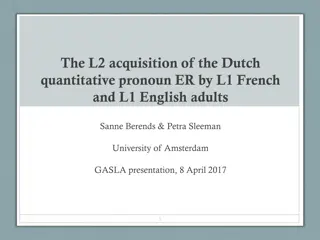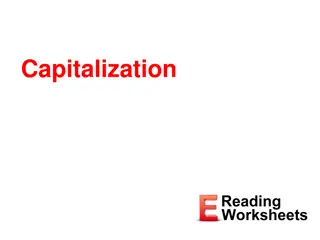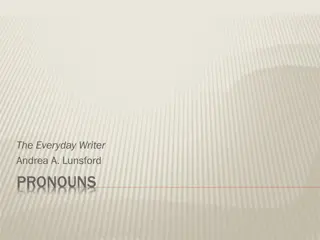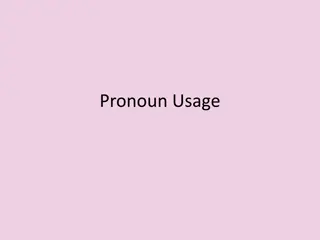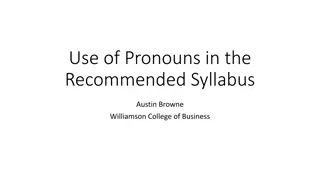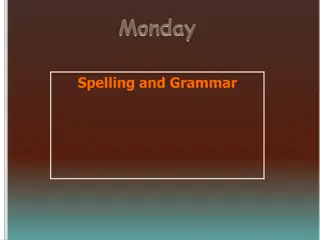
Pronouns: A Comprehensive Guide
Explore the concept of pronouns and their role in language. Learn about pronoun types, usage, and correct application through examples. Enhance your grammatical skills with this detailed overview of pronouns.
Uploaded on | 1 Views
Download Presentation

Please find below an Image/Link to download the presentation.
The content on the website is provided AS IS for your information and personal use only. It may not be sold, licensed, or shared on other websites without obtaining consent from the author. If you encounter any issues during the download, it is possible that the publisher has removed the file from their server.
You are allowed to download the files provided on this website for personal or commercial use, subject to the condition that they are used lawfully. All files are the property of their respective owners.
The content on the website is provided AS IS for your information and personal use only. It may not be sold, licensed, or shared on other websites without obtaining consent from the author.
E N D
Presentation Transcript
www.studymafia.org Seminar On Pronouns Submitted To: www.studymafia.org www.studymafia.org Submitted By:
What are pronouns? What are pronouns? Pronouns take the place of nouns. The word or phrase replaced by a pronoun is called an antecedent.
Heres the Idea A pronoun can refer to a person, place, thing, or idea.
Heres the Idea The word that a pronoun refers to is called its antecedent. Ramon visited Death Valley, and he was impressed.
Personal Pronouns Personal Pronouns Refer to people or things Include: I, me, my, mine, you, your, yours, he, him, his, she, her, hers, it, its, they, them, their, theirs, we, us, our, ours. ME! ME!
How do I use pronouns correctly? There are several important areas that you must understand in order to use pronouns correctly. Pronoun Choice Pronoun Consistency Pronoun Reference Pronoun-Antecedent Agreement I. II. III. IV.
Heres the Idea There are first-person, second-person, and third-person personal pronouns, each having both singular and plural forms.
Heres the Idea Singular Plural I went out. We left early. FIRST PERSON FIRST PERSON You left too. You are leaving. SECOND PERSON SECOND PERSON He came by bus. They came by car. THIRD PERSON THIRD PERSON
Heres the Idea Each personal pronoun forms three cases: subject, object, and possessive.
Heres the Idea Choose the pronoun form depending on the pronoun s function in the sentence. He read about Death Valley. SUBJECT Julie asked him about the rocks. OBJECT Ramon bought his book. POSSESSIVE
Why It Matters Pronouns help you talk about people concisely when you re telling a story.
Practice and Apply Write the personal pronoun in the sentence below. 1. Death Valley is famous for its strange moving boulders.
Practice and Apply Write the personal pronoun in the sentence below. 2. The rocks slide and leave long tracks behind them.
Practice and Apply Write the personal pronoun in the sentence below. 3. Do you know why this happens?
Pronouns Pronoun Agreement Here s the Idea Why It Matters Practice and Apply
Heres the Idea Antecedent The antecedent is the noun or pronoun that a pronoun replaces or refers to.
Heres the Idea Use a singular pronoun to refer to a singular antecedent. REFERS TO One story has its setting in Egypt. story its
Heres the Idea Use a plural pronoun to refer to a plural antecedent. REFERS TO The characters have their motives for murder. characters their
Heres the Idea The pronoun must agree in person with the antecedent. THIRD PERSON Louis likes his mysteries to have surprise endings. Louis his
Heres the Idea The gender of the pronoun must be the same as the gender of its antecedent.
Heres the Idea Personal pronouns have three gender forms: masculine he, his, him feminine she, her, hers neuter it, its
Heres the Idea FEMININE Agatha Christie sets many of her stories in England. Agatha Christie her MASCULINE hero his The hero has to use all his wits to solve the crime.
Why It Matters In your writing, you will sometimes refer to several people or groups of people. Correct pronoun-antecedent agreement will help your readers keep track of who is who in your writing.
Reference Reference www.google.com www.wikipedia.com www.studymafia.org


